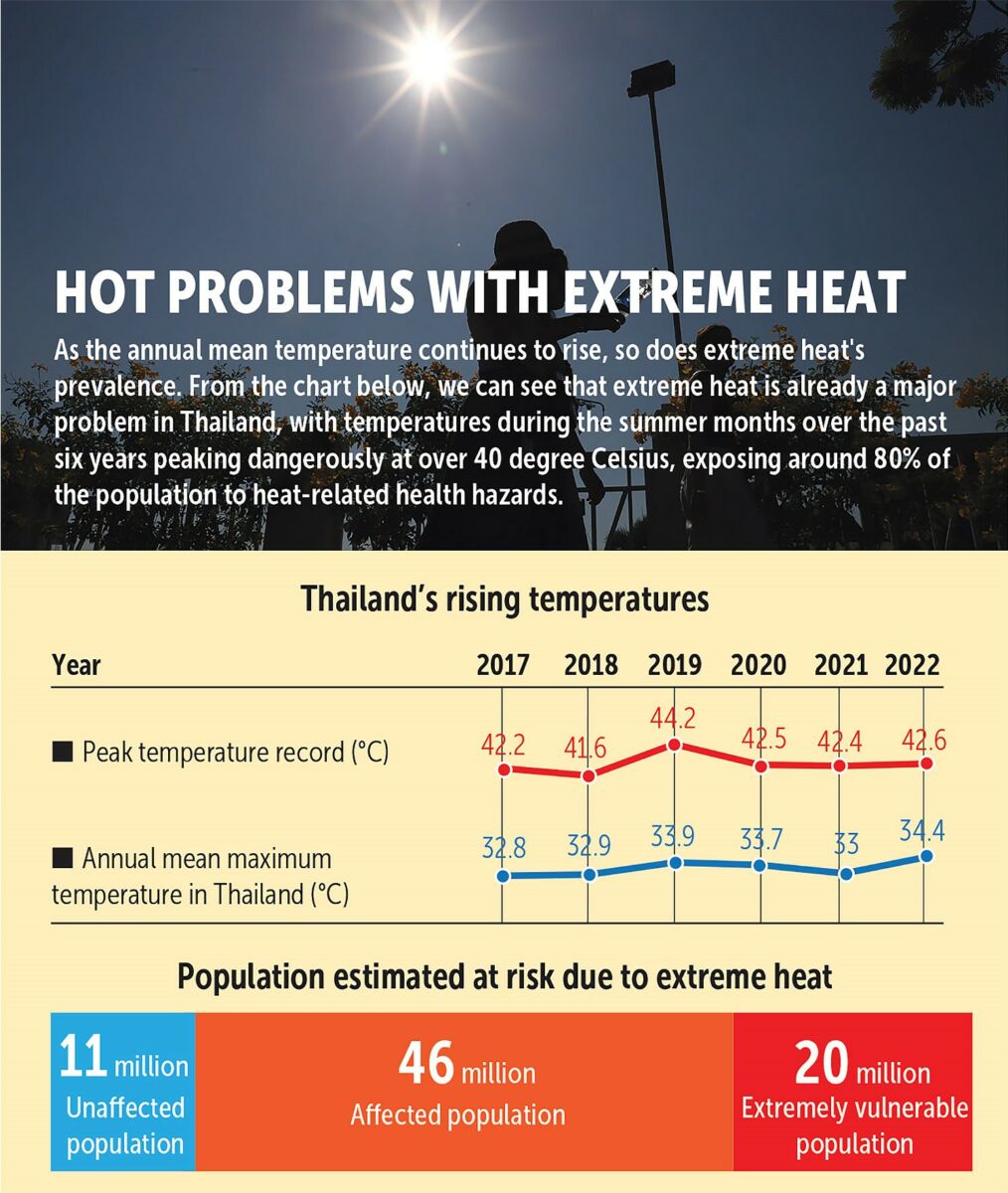Thailand braces for scorching summer as El Nino brings climate change to forefront

Climate experts are warning that Thailand will experience hotter and drier conditions in the upcoming months as a result of El Nino weather patterns, and they caution that this is just the start of the impact of climate change.
While hot and humid weather is expected at this time of year, recent heatwaves have been more extreme than anticipated. A new high-temperature record of 45.4 degrees Celsius was measured in Tak on Saturday, breaking the previous record of 44.6 degrees Celsius in Mae Hong Son on April 28, 2016.
In response, experts have called on Thai authorities to urgently address the issue as more than 80% of the population has already been affected by the increasing health threats from unbearably hot weather and water shortages.
Asst. Prof. Witsanu Attavanich said that the public must prepare for prolonged droughts and extreme heat throughout the year, reported Bangkok Post.
Agricultural economics and climate change expert at Kasetsart University, Asst. Prof. Witsanu explained that what the kingdom is experiencing is due to human-induced climate change. He added that the impact of greenhouse gas emissions from human activities has been gradually raising the global mean temperature since the industrial revolution, increasing the prevalence of extreme heat in Thailand.
Although summer heat in Thailand normally subsides with increasing rainfall when the monsoon season arrives around mid-May, this year’s extreme heat is expected to continue even after summer ends due to the warming effects of the developing El Nino phenomenon.

According to the weather projections by International Research Institute for Climate Society (IRI) and the United States’ National Oceanic and Atmospheric Administration (NOAA), there is a 62% possibility that the El Nino-Southern Oscillation (ENSO) cycle will shift from a neutral phase to El Nino phase between May and July.
Asst. Prof. Witsanu said…
“The ENSO cycle in the Pacific Ocean is another major climate factor that is highly influential to the weather condition in Thailand, as when the ENSO cycle shifts toward a warm El Nino phase, it will result in warmer and more arid conditions in the Asia-Pacific.”
Conversely, the La Nina phase will lead to cooler and more intense rainfall in this region. Therefore, it is expected that there will be less rain this rainy season to replenish water sources and cool down the weather. Since it is still unknown when the El Nino phase will end, experts warn that the country might face prolonged hot and dry conditions lasting over a year.
Farmers will be heavily affected by this weather pattern as they are directly exposed to extreme heat due to their labour in the fields, while their crops are also endangered by water shortages.
Asst Prof Witsanu said…
“As it is still unknown when the upcoming El Nino phenomenon will end, I strongly suggest the authorities prudently plan on how to protect the people from extreme heat and ensure appropriate management of water resources during the hot and dry months ahead.”
International scientific circles are concerned that El Nino may accelerate the impacts of human-induced climate change and cause the global mean temperature to rise beyond 1.5 degrees Celsius. The Paris Agreement set a global climate change mitigation target to limit global warming within a 1.5-degree Celsius threshold to protect more than 3 billion people worldwide from feared climate disasters.
Grim prospects
Dr Thiravat Hemachudha, Chief of the Thai Red Cross Emerging Infectious Diseases Health Science Centre, also expressed concerns about Thailand’s climate becoming hotter. An increase in heatstroke cases, which can be deadly, is likely.
Dr Thiravat said that more people are exposed to heatstroke as Thailand experiences longer and more frequent periods of extreme heat over 40 degrees Celsius. An increase in heatstroke-related deaths has been observed in recent years. He said…
“Heat stroke not only threatens those who have underlying health issues, the elderly, and young children. Healthy adults can also fall victim to heat-related illnesses, so we should be more conscious about the risks of overheating.”
Tara Buakamsri, Thailand Country Director for Greenpeace Southeast Asia, stated that this year’s sizzling summer is a clear result of climate change. Citing Berkeley Earth’s study on long-term temperature changes in Thailand, Tara highlighted that the annual average temperature in Thailand has gradually risen since records began in 1840.
Thailand’s mean temperature increased by up to 1.5 degrees Celsius, which is larger than the average rise of global temperature of 1.3 degrees Celsius. Tara said…
“A 1-degree change seems very small, but when considering complex weather variability in reality, only a degree of mean temperature change is significant enough to warm up the weather in some areas by several degrees and contribute to gigantic changes in the global climate system.”
Tara cited a 2019 article published in the PNAS Nexus journal, which revealed that the annual mean temperature of Thailand will increase from the current average of 26 degrees Celsius to over 29 degrees Celsius by 2070. This is on the same level as the annual mean temperature of the Sahara Desert if nothing is done to actively cut down greenhouse gas emissions and slow global warming. Under such circumstances, Thailand will regularly face extreme heatwaves, making most of the country unsuitable for living without air conditioning. Tara said…
“Even though Thai people are familiar with a hot climate, such heat, over 40 degrees Celsius, can cause serious health issues from overheating, especially given Thailand’s relatively high humidity, which can accelerate the heat index and makes it feel hotter.”
He called on authorities and policymakers to prioritise preparing the country to cope with the approaching climate challenges and take meaningful action towards mitigating climate change.
Latest Thailand News
Follow The Thaiger on Google News:


























